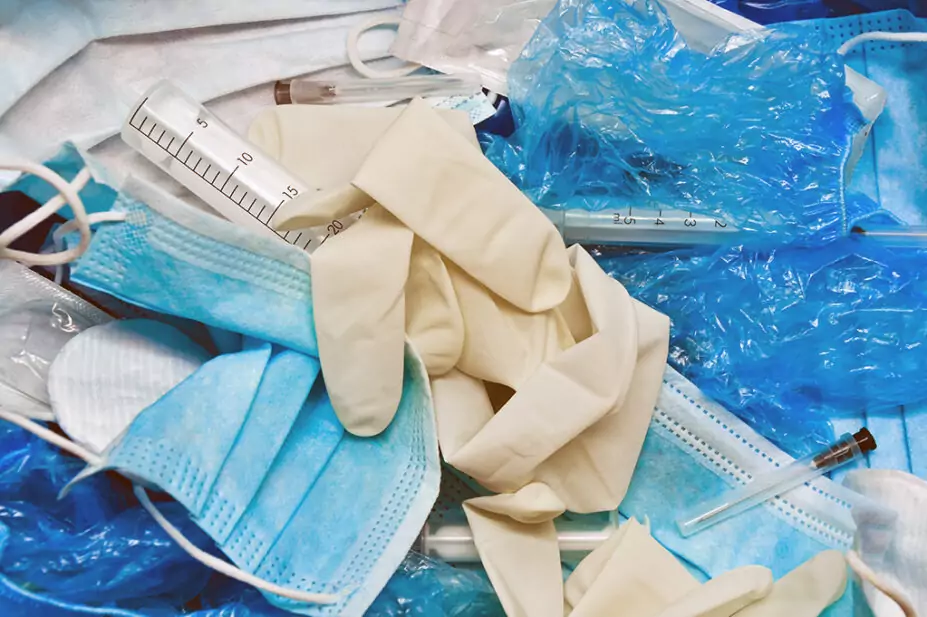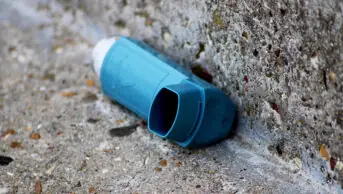
Shutterstock.com
In October 2020, the NHS took the ambitious stance of being the first health system in the world to set a NET zero goal by 2040. Since then, many things have changed and the demands on the NHS have never been greater, but the targets and vision remain.
Medicine may be the greatest challenge within the NHS as it accounts for 25% of the total NHS carbon footprint[1]. The NHS produces 1 in every 100 tonnes of domestic waste generated in the UK, with the vast majority of this going to landfill[2]. In 2016/2017, more than 590,000 tonnes of waste were produced by NHS providers in England — more than the entire municipal waste from countries such as Cyprus or Luxembourg[3].
A huge problem associated with medicines is the allied plastic that has become normalised in the past 20 years. Plastic is a global issue and a momentous one for the NHS, being the largest user of single-use plastic in Europe. The life cycle of plastics has a significant carbon footprint; in 2019, it accounted for 3.4% of global greenhouse gas emissions, or 1.8 billion tonnes[4].
There are different attitudes to plastic in different environments. Why is plastic still seen as such an acceptable material for use in the clinical environment, but so unacceptable elsewhere? Perhaps it is the perceived benefits of plastic as a tool in infection control and that single-use plastic products are often substantially cheaper at face value. But achieving short-term goals comes at the expense of not developing new innovations and technologies.
Embedded into the project was a long-term vision to reduce our culture of single-use items
In 2019, I embarked on developing strategy to remove as much single-use plastic as possible from everyday use within a busy hospital pharmacy department at Western Sussex Hospitals NHS Foundation Trust (now University Hospitals Sussex NHS Foundation Trust), which has now been replicated in East Kent Hospitals University NHS Foundation Trust. Firstly, a review of all single-use plastic bags was performed. With a vision to drastically reduce plastic consumption/waste within the hospital pharmacy department, a project was initiated that focused on the unnecessary application of single use plastic bags.
These bags were used for transporting:
- Multiple items from the dispensary to wards;
- Patients’ own medication;
- Fridge items;
- Items across sites;
- Patient discharge medication;
Procurement software was used to run reports and highlight bags that were being used the most. Working groups were established within the departments, including pharmacists, pharmacy technicians and assistants. The working group assisted in collating the data for the life cycle assessment, which were performed for each product/bag, beginning from when the bag entered the department to when it was disposed of.
Feedback from all stakeholders, including the pharmacy staff and end users, such as nursing staff, were also obtained. The feedback for some of the bags were that they were, in fact, an inconvenience for some of the nursing staff trying to access a patient’s medication.
It was vital that the solution to this problem was not just found in replacing one single-use item with another more sustainable single-use item. Instead, embedded into the project was a long-term vision to reduce our culture of single-use items. As the problem items were identified, alternatives were carefully chosen to achieve maximum single use plastic reduction.
Several measures were implemented and have since been fully adopted in two large acute hospital trusts. The following changes were made:
- The procurement team prohibited all new orders of single use plastic bags;
- Plastic bags used for patients to take medication home were used up and switched to recycled paper bags, encouraging patients to use their own bags when feasible;
- Clear and sealable transport bags used to deliver medicines were replaced by reusing cardboard boxes that were otherwise destined for waste. There was no disadvantage to this because nursing staff often reported that the bags got in the way and were often put in the bin on arrival to the ward;
- Single-use plastic fridge bags used to identify medicines that should be refrigerated were replaced with reusable canvas bags coated with plastic and impregnated with an antimicrobial substance. These met all infection control requirements for reusable bags going in and out of clinical areas;
- Green ‘patient’s own’ plastic medicines bags are designed for patients to bring their own medication from home; they were being used to provide a layer of confidentiality in the patient’s clear medicines lockers, as well as transporting medication when a patient is transferred between wards. We completely removed these from use. The clear front of the patient’s own medicine lockers were replaced with opaque Perspex to meet confidentiality requirements, which involved a small business case and minimal investment. Now, year-on-year savings are being made by not purchasing the green bags, which have now paid for the manufacture and installation of the Perspex.
Although the projects at both acute hospitals were successful, change was challenging as some people saw single-use plastic bags as essential — only after the removal occurred were people convinced that they were not required.
There was also some fear that the paper bags would not be strong enough, but since the start of this project no incidences of bag failures have been reported.
Concluding in 2022, the projects resulted in a collective annual plastic saving of nearly 300,000 pieces of single-use plastic across both trusts. This result has challenged the view that single-use items of plastic used in healthcare settings are essential.
Plastic has infiltrated every part of the NHS’s working practice: single-use bags, latex gloves, masks and aprons have all become normalised in vast quantities. Visionaries are needed to challenge existing practices, share ideas and lead innovation.
We must continue to confront our dependence on plastic in healthcare.
Sam Coombes is lead medicines information technician, East Kent Hospitals University Foundation Trust
- 1Delivering a ‘Net Zero’ National Health Service. NHS England. 2020.https://www.england.nhs.uk/greenernhs/wp-content/uploads/sites/51/2020/10/delivering-a-net-zero-national-health-service.pdf (accessed Mar 2023).
- 2Taking the temperature: Towards an NHS response to global warming. NHS Confederation. 2007.https://neweconomics.org/uploads/files/0470875947be753b1c_flm6b5qxl.pdf (accessed Mar 2023).
- 3Boxall ABA, Dalton AR. New Horizons. In: Annual Report of the Chief Medical Officer 2017, Health Impacts of All Pollution – what do we know? White Rose Research Online 2018. 107–38.
- 4Plastic leakage and greenhouse gas emissions are increasing. Organisation for Economic Co-operation and Development. https://www.oecd.org/environment/plastics/increased-plastic-leakage-and-greenhouse-gas-emissions.htm (accessed Mar 2023).


